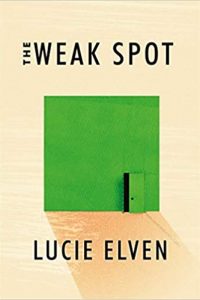Caren Gussoff Sumption Reviews The Curator by Owen King
 The Curator, Owen King (Scribner 978-1-98219-680-6, $28.99, 480pp, tp) March 2023.
The Curator, Owen King (Scribner 978-1-98219-680-6, $28.99, 480pp, tp) March 2023.
The last thing I was expecting as I cracked open Owen King’s latest novel, The Curator, was an homage to Sir Terry Pratchett. But there it was, inside this sprawling 480-page epic: a world, both familiar and strange, as deeply imagined in history and lore, and as pointed in satire as the Discworld itself, all centered on an imagined city-state fondly (and sneeringly) nicknamed “The Fairest.”
The Fairest, as beloved and disparaged by its citizenry, is in an undeniable moment of unrest as we enter her borders. The king and his corrupt aristocracy have been usurped by a ragtag revolution, led by students, an unstable playwright, and some random ex-military types, who’ve formed the “Volunteer Civil Defense” force – and, who are now left to try and re-establish order (and new living standards) amongst the extremely class-divided residents. And these residents, who range from the cat-worshipping poor who live in the slum-like neighborhood called “The Lees” to the wealthy and educated who remained behind in support of the revolution, as well as everyone in between.
Main protagonist, Dora – or “D” as she prefers to be called, in honor of the nickname given her by her beloved brother, Ambrose – has fallen on hard times. Born to privilege, Dora is forced into servitude after being orphaned by her unloving, cold parents and abandonment by her well-meaning, alcoholic nurse. She was completely alone, as Ambrose has died in mysterious circumstances, something which may or may not have anything to do with his secret studies at the Society for Psykical Research. But the revolution has freed D, and, with the assistance of her boyfriend (the Lieutenant Robert Barnes, a representative of the wealthy and educated believers and well-meaning member of the Volunteer Civil Defense), D gains a place as the curator of the National Museum of the Worker.
D had hoped for placement at the Society for Psykical Research so she could try to uncover more about Ambrose’s death, but the society building had been burned and razed during fighting. The museum is near the ruins of the society’s building, so D accepts the position and digs into rehabbing the long-neglected museum, with its broken-down wax figures, piles of dust…and exhibits which seem to appear overnight, predicting machines and professions which do not yet exist in The Fairest, and which are all designed for mass destruction. And this is where things start to get weird.
It is also where all that’s Pratchett-like splits away from being Pratchett-like. There are layers and layers of strangeness, bizarre, magical conspiracies, and a morgue ship mysteriously sets sail from the harbor, collecting the souls of anyone from The Fairest who “didn’t get a fair shake.” There’s a cabinet which may or may not be a portal to another world, where a crone will sew a different reflection onto your face if you ask her nicely. And always, there are cats, not just the stray cats of any seaside city, but cats who probably are literal descendants of the Devil, who lead and direct the actions of citizens to satisfy their own, unspoken agenda.
However, these layers and layers lack the underlying humor and graciousness of Pratchett, who was known for, yes, pointed satire, but also for the velvet tip that covered the deadly point of his satire spear. Pratchett magnified human foibles to their most ridiculous, but always with a gentleness that suggested we could do better, and faith that we would. Whereas in King’s world, there is a better future that can be had – and the end of The Curator suggests that D has led The Fairest to, at least, being on the right track, there’s a savagery and cruelty in the world of The Curator that makes it very much its own thing.
Probably, rightly so, much of the savagery in The Fairest is unnecessary. There is a Volunteer Civil Defense-appointed serial killer who’s taken residence at the embassy directly next door to D’s museum, and the systemic, nightly torture and murder of, well, pretty much anyone who walks by is brutal. It does nothing besides add another obstacle – element of danger – to those who are trying to rehab the city, and eliminates a number of characters from the novel’s multiple points of view. It’s a plot device that both adds authenticity to the feeling of a city in disarray and is ultimately troubling. There doesn’t need to be this horror element, and, at best, it is a red herring amongst the numerous plotlines and cabals that all come to a boil at once – and are difficult enough, halfway through the novel, to keep track of without additional confusion. As stated, however, the extra abominations don’t feel wrong. King has created a completely detailed and utterly immoral universe, where goodness always costs more than evil. Even the heroic, principled D is a bit of a monster in the end, as she reveals what really happened to her parents. Innocence is a spectrum in The Fairest, and that, indeed, is what King intends us to see as reflections of our world, right now, as it is. It’s uncomfortably and brilliantly timely, and squirming worthwhile.
Caren Gussoff Sumption is a writer, editor, Tarot reader, and reseller living outside Seattle, WA with her husband, the artist and data scientist, Chris Sumption, and their ridiculously spoiled cat-children.
Born in New York, she attended the University of Colorado, the School of the Art Institute of Chicago, Clarion West (as the Carl Brandon Society’s Octavia Butler scholar) and the Launchpad Astronomy Workshop. Caren is also a Hedgebrook alum (2010, 2016). She started writing fiction and teaching professionally in 2000, with the publication of her first novel, Homecoming.
Caren is a big, fat feminist killjoy of Jewish and Romany heritages. She loves serial commas, quadruple espressos, knitting, the new golden age of television, and over-analyzing things. Her turn offs include ear infections, black mold, and raisins in oatmeal cookies.
This review and more like it in the May 2023 issue of Locus.
 While you are here, please take a moment to support Locus with a one-time or recurring donation. We rely on reader donations to keep the magazine and site going, and would like to keep the site paywall free, but WE NEED YOUR FINANCIAL SUPPORT to continue quality coverage of the science fiction and fantasy field.
While you are here, please take a moment to support Locus with a one-time or recurring donation. We rely on reader donations to keep the magazine and site going, and would like to keep the site paywall free, but WE NEED YOUR FINANCIAL SUPPORT to continue quality coverage of the science fiction and fantasy field.
©Locus Magazine. Copyrighted material may not be republished without permission of LSFF.






